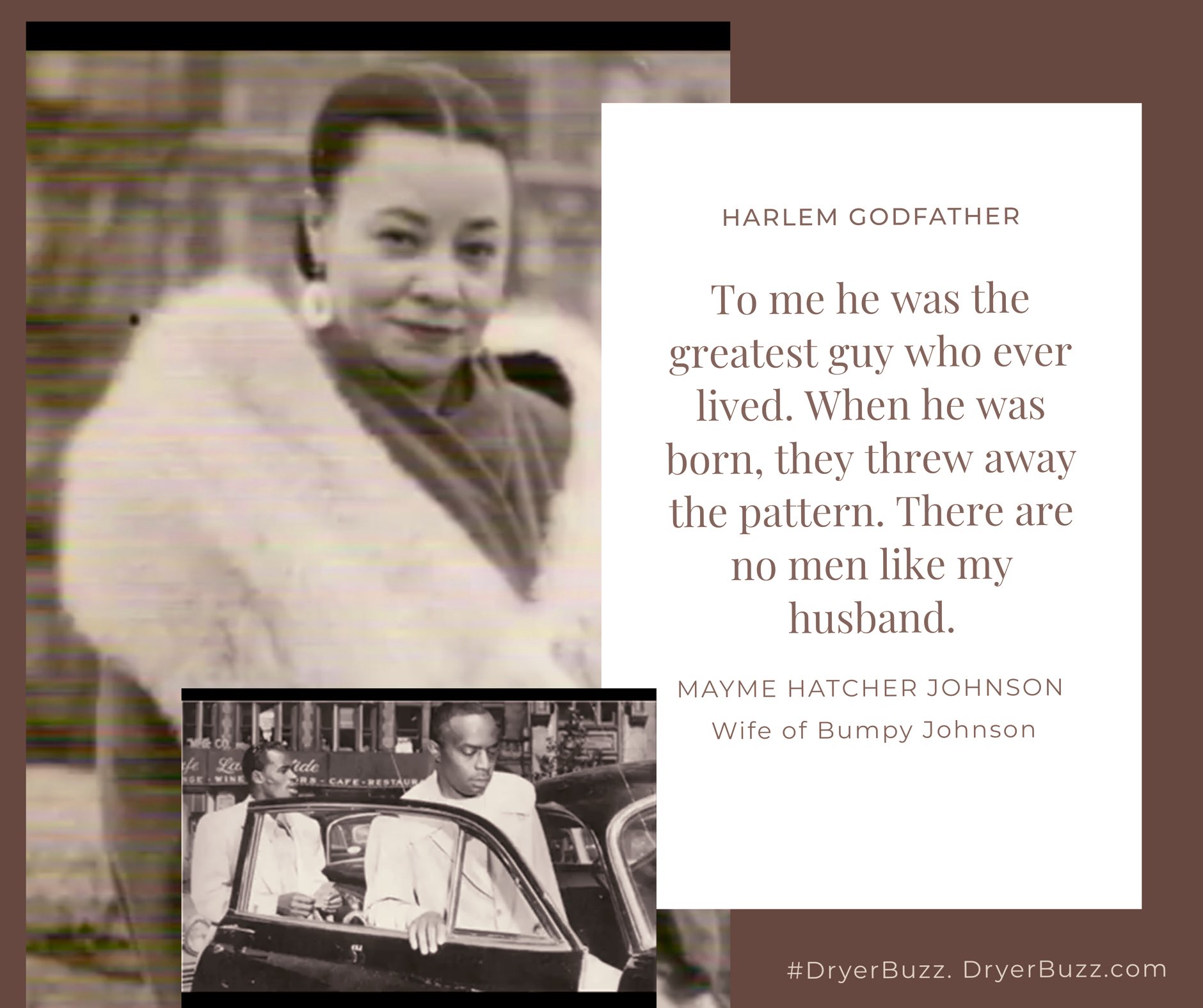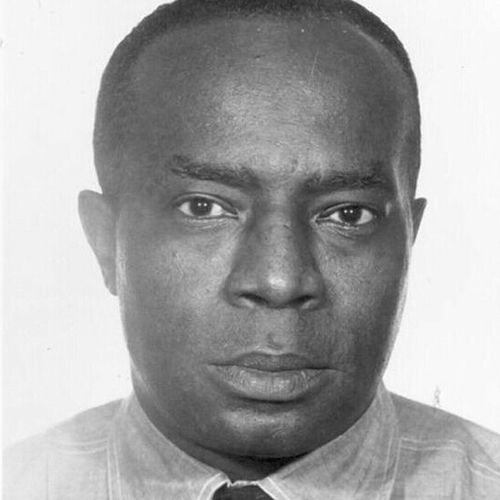Bumpy Johnson: The Untouchable Legend Who Ruled The Streets
When you hear the name Bumpy Johnson, it’s like diving straight into the gritty underworld of 1950s Harlem. This ain’t just some random guy; Bumpy was a force to be reckoned with. Known as the "Harlem Godfather," he wasn’t just your average gangster. He was a mastermind, a strategist, and a man who could charm his way out of trouble—or punch his way through it if he had to. But what made Bumpy so special? Stick around, and we’ll break it down for you.
Now, before we dive deep into the world of Bumpy Johnson, let’s set the stage. Picture this: Harlem in the mid-20th century. It was a melting pot of culture, music, and, unfortunately, crime. Bumpy wasn’t just part of the scene; he was the scene. His influence stretched far beyond the streets, reaching into the halls of power. But don’t think for a second that his journey was easy. Nope, Bumpy’s story is one of survival, resilience, and sheer willpower.
So, why should you care about Bumpy Johnson? Well, his life wasn’t just about crime and punishment. Bumpy was a symbol of resistance against racial oppression. He fought for his community, even if his methods weren’t always… legal. In a world where the odds were stacked against him, Bumpy found a way to rise above—or at least stay afloat. And that, my friend, is a story worth telling.
Who Was Bumpy Johnson? A Biographical Overview
Before we get into the nitty-gritty of Bumpy’s life, let’s take a moment to understand who this guy really was. Bumpy Johnson, born Ellsworth Raymond Johnson on October 31, 1905, in Charleston, South Carolina, was more than just a name. He was a legend, a figure who straddled the line between criminal and community leader.
Let’s break it down with some quick facts:
- Bumpy was the youngest of seven children.
- He got his nickname "Bumpy" from a bump on his forehead, which he earned in a childhood accident.
- His rise to power began in Harlem, where he quickly became a key player in the underworld.
But let’s not forget the stats that matter most: Bumpy was a man who defied the odds. He survived 40 years in the game, dealing with everything from police crackdowns to rival gangs. And through it all, he remained a beloved figure in Harlem, where he was seen as a protector of the people.
Bumpy Johnson’s Early Life: The Making of a Legend
Growing up in Charleston wasn’t easy for Bumpy. Racism was rampant, and opportunities for Black folks were few and far between. But Bumpy wasn’t one to let circumstances dictate his fate. From a young age, he showed signs of being a natural leader. He was street-smart, quick-thinking, and fearless.
By the time he moved to Harlem in the 1920s, Bumpy was ready to make a name for himself. Harlem was a place of opportunity, but it was also dangerous. The streets were controlled by various gangs, and Bumpy knew he had to play his cards right if he wanted to survive.
Bumpy Johnson’s Rise to Power
So, how did Bumpy go from being just another guy on the streets to the "Harlem Godfather"? It wasn’t easy, but it was strategic. Bumpy wasn’t just about brute force; he was a thinker. He knew how to navigate the complex world of organized crime, and he wasn’t afraid to make deals with the devil—or, in this case, the Mafia.
One of Bumpy’s biggest moves was his alliance with the Italian Mafia. In the 1950s, the Mafia controlled the numbers racket in Harlem. Bumpy saw an opportunity and seized it. He negotiated a deal that allowed him to run the numbers game in Harlem, with a cut going to the Mafia. This move not only solidified his power but also earned him respect from both sides.
The Numbers Game: Bumpy’s Bread and Butter
The numbers game was more than just a way for Bumpy to make money. It was a lifeline for the community. Many people in Harlem relied on the numbers game as a form of entertainment and, sometimes, as a way to make ends meet. Bumpy understood this and made sure that the game was fair—for the most part.
But let’s not kid ourselves. The numbers game was illegal, and Bumpy wasn’t exactly Mr. Clean. However, he did something that set him apart from other gangsters: he reinvested in the community. Bumpy used his profits to support local businesses, fund scholarships, and even help out families in need. This earned him a lot of goodwill among the people of Harlem.
Bumpy Johnson vs. Law Enforcement
Now, let’s talk about Bumpy’s relationship with the law. Let’s just say it wasn’t always peachy. Bumpy spent a lot of time dodging the cops, and he wasn’t exactly shy about it. He was arrested numerous times, but he always seemed to slip through the cracks. Some say it was because of his connections; others say it was pure luck. Either way, Bumpy was untouchable—or so it seemed.
One of the most famous incidents involving Bumpy and the law was the "Harlem Uprising" of 1964. Bumpy played a key role in calming the tensions between the community and the police. He used his influence to prevent the situation from escalating, earning him even more respect from his people.
The Trials and Tribulations: Bumpy’s Legal Battles
Over the years, Bumpy faced many legal challenges. He was accused of everything from racketeering to drug trafficking. But through it all, he managed to stay out of jail—or at least out of long-term confinement. Bumpy was a master negotiator, and he knew how to work the system to his advantage.
One of the most interesting aspects of Bumpy’s legal battles was his ability to turn enemies into allies. He wasn’t afraid to make deals with the police or even testify against other criminals if it meant protecting his interests. This strategy may not have been noble, but it was effective.
Bumpy Johnson’s Legacy: A Man of Contradictions
When you think about Bumpy Johnson, it’s hard not to see the contradictions. On one hand, he was a criminal mastermind who profited from illegal activities. On the other hand, he was a community leader who used his wealth to help those in need. So, how do we reconcile these two sides of Bumpy?
For many people in Harlem, Bumpy was a hero. He stood up to racial oppression and fought for his community, even if his methods weren’t always legal. He was a symbol of resistance in a world that often seemed stacked against him.
Remembering Bumpy: The Man Behind the Myth
As we reflect on Bumpy’s life, it’s important to remember the man behind the myth. Bumpy wasn’t just a gangster; he was a complex individual who defied easy categorization. He was a product of his time, shaped by the challenges and opportunities he faced.
But what can we learn from Bumpy’s story? For one, resilience. Bumpy faced countless obstacles, but he never gave up. He found ways to adapt and thrive in a world that often seemed hostile. And while his methods may not have been perfect, his commitment to his community was unwavering.
Bumpy Johnson in Popular Culture
Bumpy’s legacy extends beyond the streets of Harlem. He’s been immortalized in films, books, and even music. One of the most famous portrayals of Bumpy is in the movie "American Gangster," where he’s played by the legendary Chiwetel Ejiofor. The film captures Bumpy’s complexity and charisma, bringing his story to a wider audience.
But Bumpy’s influence isn’t just limited to Hollywood. He’s also been the subject of numerous documentaries and academic studies, all trying to understand the man who became a legend.
Why Bumpy Johnson Matters Today
In today’s world, Bumpy’s story is more relevant than ever. He reminds us of the power of resilience, the importance of community, and the complexities of human nature. Bumpy wasn’t perfect, but he was real. And in a world that often tries to simplify things, his story is a powerful reminder that life is rarely black and white.
The Numbers Don’t Lie: Bumpy’s Impact on Harlem
When we talk about Bumpy’s impact on Harlem, the numbers tell a compelling story. During his reign, the numbers game brought in millions of dollars each year. But it wasn’t just about the money. Bumpy’s influence extended into every corner of the community, from local businesses to social services.
According to historians, Bumpy’s contributions to Harlem were significant. He helped fund schools, support local artists, and even provide jobs for those in need. While his methods may have been controversial, his impact was undeniable.
Lessons from Bumpy: What We Can Learn
So, what can we learn from Bumpy Johnson’s life? For starters, the importance of community. Bumpy understood that success isn’t just about personal gain; it’s about lifting others up along the way. He also taught us the value of resilience and the power of adaptability. In a world that’s constantly changing, Bumpy’s ability to navigate the challenges of his time is a lesson we can all learn from.
Conclusion: The Untouchable Legend
As we wrap up our journey through Bumpy Johnson’s life, it’s clear that he was a man of immense influence and complexity. He wasn’t just a gangster; he was a symbol of resistance, a community leader, and a legend in his own right. His story is a testament to the power of resilience and the importance of community.
So, what’s next? If you enjoyed this article, why not share it with your friends? Or, better yet, dive deeper into the world of Bumpy Johnson by checking out some of the resources we’ve mentioned. And remember, the next time you hear the name Bumpy Johnson, don’t just think of a gangster—think of a man who defied the odds and left an indelible mark on history.
Table of Contents
- Who Was Bumpy Johnson? A Biographical Overview
- Bumpy Johnson’s Early Life: The Making of a Legend
- Bumpy Johnson’s Rise to Power
- The Numbers Game: Bumpy’s Bread and Butter
- Bumpy Johnson vs. Law Enforcement
- The Trials and Tribulations: Bumpy’s Legal Battles
- Bumpy Johnson’s Legacy: A Man of Contradictions
- Remembering Bumpy: The Man Behind the Myth
- Bumpy Johnson in Popular Culture
- Why Bumpy Johnson Matters Today
- The Numbers Don’t Lie: Bumpy’s Impact on Harlem
- Lessons from Bumpy: What We Can Learn
- Conclusion: The Untouchable Legend
Valvoline Coupon $25 Off Oil Change: Save Big On Your Next Oil Change!
Tim Scott's First Wife: The Untold Story Behind The Spotlight
Joe Gatto SA: The Untold Story Behind The King Of Pranks

Meet Bumpy Johnson’s Daughter Elise Profvalue Blog

Who Was Bumpy Johnson? How Reallife Gangster's Story, 54 OFF

Bumpy Johnson Wife, Death & Movie